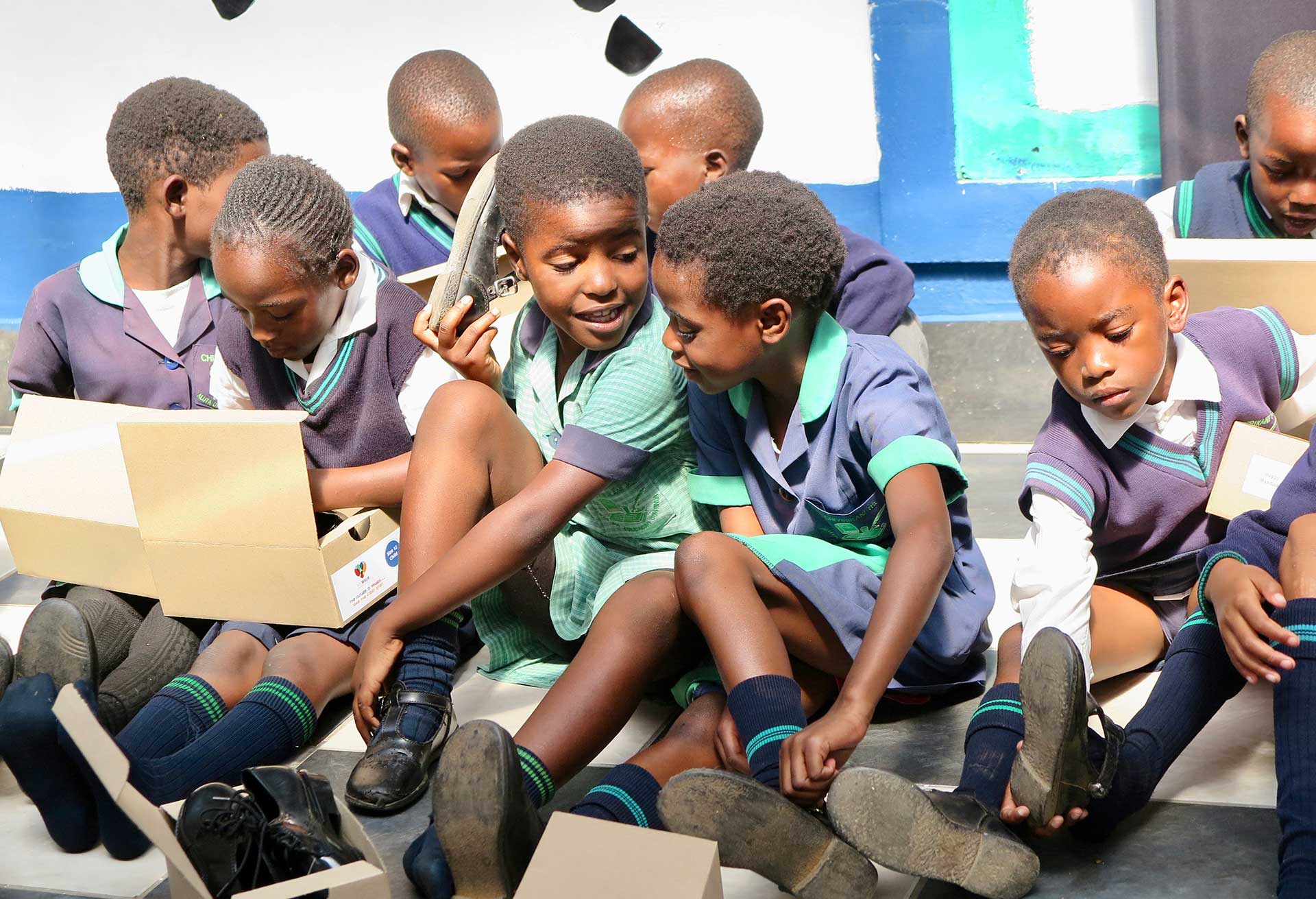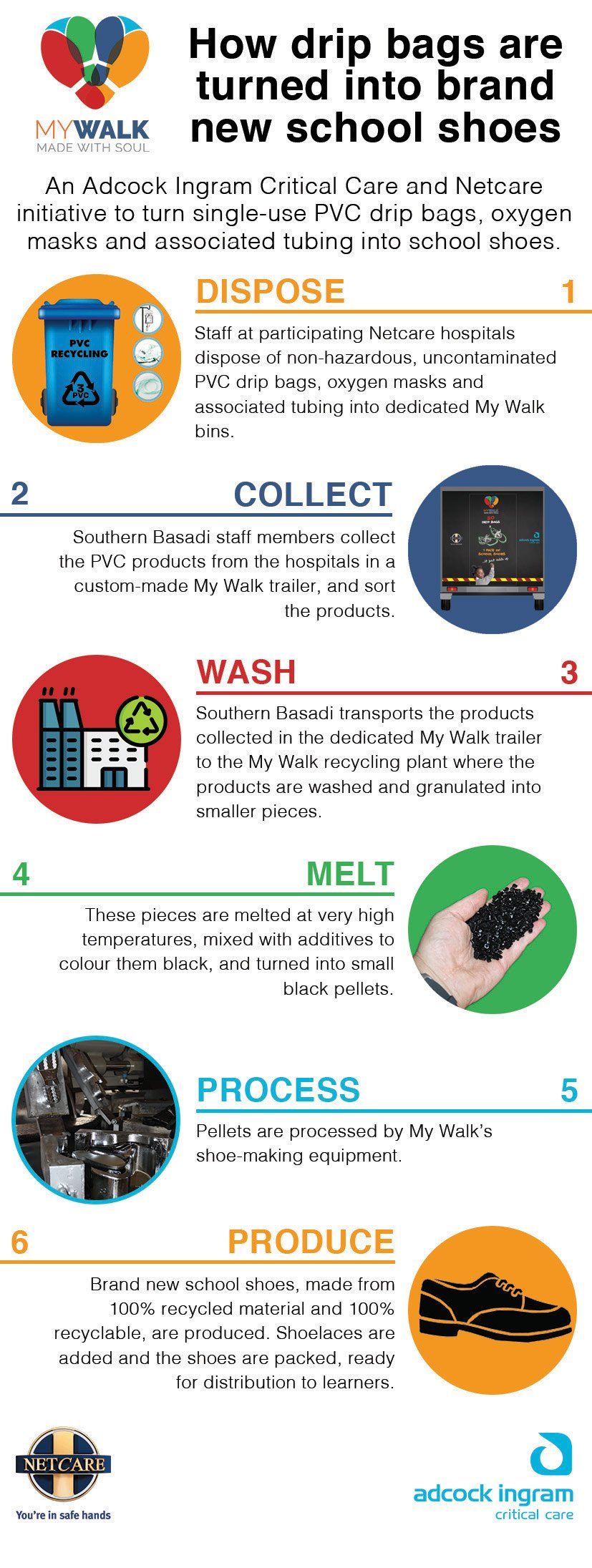My Walk initiative: Enterprise development and job creation opportunities generated by recycling healthcare waste
Drickus Maartens • February 10, 2020
Excited Grade 2 learners at Chivirikani Primary School wasted no time in trying on their new shoes at the launch of the My Walk initiative. Learners at the school, some 1 300 in total, were the first to receive brand new shoes made from recycled uncontaminated PVC IV drip bags through Netcare and Adcock Ingram Critical Care’s My Walk initiative.
The process of turning uncontaminated PVC healthcare waste into school shoes not only creates value for the learners who will receive a brand new pair of shoes, it also creates a new value chain that unlocks economic opportunities and contributes to skills development and job creation.
“The innovations that are emerging as part of Netcare
and Adcock Ingram
Critical Care’s My Walk initiative and the efforts to increase the scale of the project are showing great promise in assisting emerging businesses to develop, which in turn, will contribute to job creation,” says Dr Nceba Ndzwayiba, Netcare’s director: transformation.
Southern Basadi is the first enterprise development partner to benefit from the My Walk initiative. This small enterprise received assistance in the purchasing of a light delivery vehicle and customised trailer that will be used for the sorting and collection of uncontaminated used PVC drip bags, oxygen masks and associated tubing from participating Netcare hospitals.
“The My Walk initiative requires a waste service provider dedicated to the collection of the PVC products earmarked for recycling from the participating Netcare hospitals’ premises. Southern Basadi began operating in 2014 as a small-scale business that provided grass cutting and recycling services as part of the Jozi@Work programme. Having registered on the City of Joburg’s supplier database as part of the programme, this women-led company was identified as a potential enterprise development partner and this paved the way for their business’ selection as a My Walk partner, and we are proud to see them grow and mature with the My Walk initiative,” he explains.
Netcare’s enterprise development team assisted Southern Basadi to obtain the relevant licenses and registrations required by the Department of Environmental Affairs and, together with the My Walk staff, provides on-going support to develop its business processes and nurture its growth.
To date, My Walk, under the leadership of Delanie Bezuidenhout as its general manager, has trained more than 3 500 Netare staff members at participating hospitals. Training focuses on the correct procedures for separating the non-hazardous and uncontaminated, recyclable PVC drip bags, masks and tubing from other types of waste at point of generation, and to then dispose of these items in specially marked My Walk containers, ready for collection by Southern Basadi.
Southern Basadi uses their custom built sorting trailer to ensure that no contaminated material leaves the healthcare facility. The collected material is then transported and delivered to the My Walk factory where it is washed, granulated into smaller pieces, melted at high temperature, then mixed with additives to achieve a black colouring and extruded into pellets. The pellets are then processed in shoe-making equipment to produce brand new, fully recycled, waterproof and shiny new school shoes within minutes. Shoe laces are added and the shoes are packaged, ready for distribution to learners in need.
Delores MacKenzie, one of the directors of Southern Basadi, says that the support from Netcare and Adock Ingram Critical Care through the My Walk initiative has been invaluable to their business.
“The hospitals reimburse us for the waste management service we provide to them, and we then further build our revenue by selling the recovered PVC to the recycling plant. It has been a steep learning curve, but our company has created eight additional jobs to date and the experience we have gained is helping us plan for expansion in the future.
“It is extremely motivating to be part of this very worthy initiative. Knowing that our work is helping to provide school shoes for disadvantaged and vulnerable learners is particularly rewarding. We are working hard to create our own destiny, and we hope that we will be able to grow the number of people we employ as this project expands in the years to come,” MacKenzie adds.
Dr Ndzwayiba says that with the volume of Netcare’s recyclable PVC material projected to increase to 55 tons in 2023, from 19 tons in 2019, more opportunities for enterprise development and job creation will open up as the project matures.
The My Walk Board of Trustees recently took a decision to insource the pelletising and shoe manufacturing processes for a period of 12 to 18 months, with the view of growing the business till it stabilises and reaches maturity; and later look for, and sell it to, a suitable emerging enterprise development partner as a going concern.
“We see great potential for more entrepreneurs and small black businesses, in particular, to become part of the My Walk value chain in time and develop their businesses to create more job opportunities. The My Walk initiative’s impact goes far beyond the learners who will benefit from the school shoes they receive; it is helping to create a more sustainable future with more economic opportunities,” he concludes.

Colorectal cancer, one of the most prevalent yet preventable cancers, can develop in the colon or rectum, often starting as small polyps that can quietly become malignant if left unchecked. Dr Mpho Ramabulana, a colorectal surgeon and gastroenterologist at Netcare Akasia Hospital, underscores the life-saving power of vigilance and the importance of early detection.

The lives of millions of South Africans with a litany of rare diseases can be vastly improved, and even saved, by addressing challenges in identifying, studying and treating their conditions. With Rare Disease Day on the 28th of February 2025, the Rare Diseases Access Initiative (RDAI) is driving an evolution of the country’s healthcare, through innovative strategies to better care for over 4.2million people living with an estimated 7000 rare diseases. “As our healthcare system faces significant changes in the years ahead, it is vital that we also advocate for people living with rare diseases in South Africa, especially those with limited healthcare access,” said Kelly du Plessis, CEO of Rare Diseases South Africa (RDSA), a member of RDAI. “As part of our ongoing research and awareness efforts, RDAI has conducted an initial analysis of the incidence and prevalence of rare diseases within the country.” This research will assist in improving access to healthcare, policy development, and patient advocacy, while giving critical insight into the challenges faced by patients. “According to research, some rare diseases affect fewer than 1 in a million people, while others, such as Down syndrome, cystic fibrosis, and haemophilia, have a more recognisable prevalence,” says Dr. Helen Malherbe, RDAI lead researcher on rare disease prevalence data. “Many conditions are undetected, underdiagnosed or misdiagnosed, with too many having no information available about them at all.” The RDAI was formed in 2019 to promote a more favourable environment for those impacted by rare diseases in South Africa. Participants include Ampath, the Board of Healthcare Funders (BHF), Discovery Health, Genetic Counsellors South Africa (SASHG), the Government Employees Medical Scheme (GEMS), Health Funders Association (HFA), Medihelp, Medscheme, North-West University (NWU), Rare Diseases South Africa (RDSA), the South African Medical Association (SAMA) and The South African Medical Technology Industry Association (SAMED). The Council for Medical Schemes (CMS) participates as an observer. In the same year, Rare Disease International signed a memorandum of understanding with the World Health Organisation leading to an international rare disease policy framework. In 2021, the United Nations General Assembly moved to adopt a resolution recognising 300 million people living with rare diseases worldwide. “A general lack of awareness and delayed diagnosis remain major hurdles for those affected by rare diseases. Policymakers and healthcare stakeholders need to prioritise access to treatment, diagnosis, and support for rare disease patients,” says Bada Pharasi, CEO of IPASA, “Through this initiative, working collaboratively with stakeholders at every level of the healthcare supply chain, we can bring real and meaningful change to those affected, including family members and care givers, through smart and efficient strategies.” The globally agreed definition of a rare disease is any medical condition with a specific pattern of clinical signs, symptoms, and findings that affects fewer than or equal to 1 in 2000 persons in a population. “Most are genetic, and some are inherited and passed down in families,” Malherbe says. “Some affect only the patient’s genetic recipe, while others may be acquired during life due to infection, trauma, or environmental effects. For many, the cause is still unknown. “These conditions mainly affect children, as they are largely incurable and many are life-threatening. Some require specialised and co-ordinated care, some have limited and expensive treatment options, while others have no information or effective treatments at all,” she adds. The RDAI is calling for a patient-centred care model built on equitable access, transparency and efficiency. Naturally, this model calls for the open participation of patients, the healthcare industry, health professionals, and the Government. “The most critical elements are robust diagnosis standards, improved access to treatment, data collection and management, co-ordination of care, measurement of outcomes and ongoing collaborative research,” du Plessis says. “We need to establish rare disease advisory committees, map gaps and opportunities, establish system requirements, create a roadmap and plan a phased implementation with clear timelines.” The RDAI states that these policy development steps would be a start in quantifying the disease burden and defining standards of care. This would be followed by building and strengthening the capacity to facilitate appropriate diagnosis, treatment, continuity and data monitoring. Thoneshan Naidoo, Chief Executive Officer of the Health Funders Association noted that, “We appreciate the unique opportunity provided by RDAI which enables stakeholders across the industry to work together and identify strategies that improve equitable access to the appropriate diagnosis, treatment and healthcare services for rare disease patients, in an affordable and sustainable manner, taking account of the other pressing needs across the healthcare system.” “True innovation in healthcare is only possible through partnerships and joint advocacy efforts that raise awareness and improve access to treatment. Our long-term goal is the development of a rare diseases policy framework and guidelines for coordinated care,” says Pharasi. “Our members are united in the commitment to unlocking improved patient outcomes and improving access to services and robust health needs assessment facilities.” he concludes. About RDAI The Rare Diseases Access Initiative (RDAI) is dedicated to advocating for improved healthcare access, policy development, and patient support for those affected by rare diseases in South Africa. The initiative brings together key healthcare stakeholders, including pharmaceutical associations, funders, genetic specialists, and patient advocacy groups, to drive impactful change. About RDSA Founded in 2013, Rare Diseases South Africa (RDSA) is a non-profit organisation advocating to ensure that people living with rare diseases and congenital disorders experience greater recognition, support, improved health service and better overall quality of life. Started out of personal need following the diagnosis of organisation founder, Kelly du Plessis' son, it became evident that there was a lack of awareness and support for rare diseases in general in South Africa. About IPASA The Innovative Pharmaceutical Association South Africa (IPASA) is a voluntary trade association representing 24 leading pharmaceutical companies committed to research, development, and innovation. Our mission is to drive healthcare advancement by advocating for policies that improve patient access to safe, high-quality, and affordable medicines.












